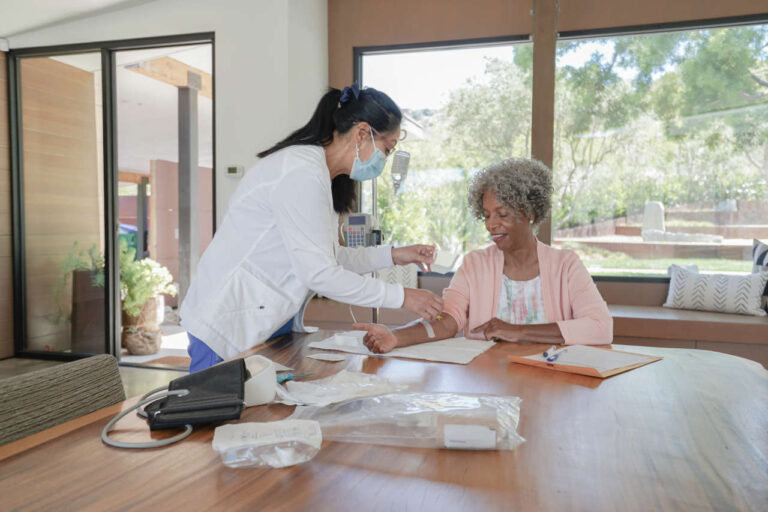
La premedicación con inmunoglobulina intravenosa (IVIG) es una de las formas de minimizar los efectos secundarios relacionados con la infusión.
Obtenga asistencia para el copago de IgIV
Asistencia financiera para la IgIVAunque inmunoglobulina intravenosa (IVIG) Si bien se tolera bien, algunos usuarios pueden experimentar efectos secundarios como sofocos, dolor de cabeza, malestar general, fiebre, escalofríos y fatiga. Los efectos secundarios raros y graves pueden incluir:
- Insuficiencia renal
- Trombosis (coágulo de sangre dentro de un vaso sanguíneo)
- Arritmia (latidos cardíacos irregulares)
- Meningitis aséptica (inflamación del revestimiento del cerebro)
- Anemia hemolítica (un trastorno de las células sanguíneas)
- Lesión pulmonar aguda relacionada con la transfusión (TRALI)
Algunas estrategias para reducir el riesgo de efectos secundarios incluyen:
- Disminuir la velocidad de infusión o reducir la dosis
- Cambiar de De IgIV a IgSC (inmunoglobulina subcutánea)
- Cambio a otras preparaciones de inmunoglobulina
¿Qué es la premedicación con IgIV?
La premedicación con IgIV implica la administración de uno o más medicamentos aproximadamente 30 minutos antes de iniciar la terapia con IgIV. Esto se hace para reducir la probabilidad de efectos secundarios durante la infusión de IgIV.
También puede recibir premedicación si experimenta efectos secundarios durante la terapia.
Antes de administrarle premedicación, su médico le preguntará acerca de cualquier evento adverso previo de la terapia con IgIV y evaluará el riesgo actual de posibles efectos secundarios.
¿Cuáles son las premedicaciones de IgIV más frecuentemente utilizadas?
Los siguientes medicamentos se utilizan comúnmente:
Analgésicos
También llamados analgésicos, estos medicamentos alivian el dolor. El acetaminofén (Tylenol) es el analgésico más utilizado para la premedicación con IgIV. La dosis habitual para adultos es de 650 mg por vía oral una sola vez. La dosis oral para niños depende de su peso corporal.
Medicamentos antiinflamatorios llamados AINE También podrían ser necesarios antiinflamatorios no esteroideos, como el ibuprofeno (Advil, Motrin) y el naproxeno (Aleve).
Antihistamínicos
Estos medicamentos tratan los síntomas de reacciones alérgicas, como erupciones cutáneas, hinchazón o picazón. Algunos ejemplos incluyen:
- Difenhidramina (Benadryl)La dosis habitual en adultos es de 25 mg a 50 mg por vía oral o intravenosa única. Este es el antihistamínico más comúnmente recetado para la premedicación.
- Loratadina (Claritin):10 mg por vía oral una vez.
- Cetirizina (Zyrtec):10 mg por vía oral una vez.
- Fexofenadina (Allegra):180 mg por vía oral una vez.
Corticosteroides
También llamados esteroides, estos medicamentos ayudan a reducir la inflamación y la hinchazón. Los corticosteroides que se utilizan con frecuencia para la premedicación con IgIV son:
- Dexametasona (Decadrón):La dosis habitual para adultos es de 4 mg por vía oral o intravenosa una sola vez.
- Metilprednisolona (Medrol):20 mg a 60 mg IV una vez.
- Hidrocortisona (Hydrocort):50 mg a 200 mg IV una vez.
Nota: Estos esteroides no son los mismos que algunos atletas abusan, conocidos como esteroides anabólicos.
La elección del medicamento y el protocolo de premedicación pueden variar según sus necesidades específicas, la coexistencia de otras afecciones médicas y los medicamentos que toma. También es posible que su médico continúe usando la premedicación en dosis más bajas después del tratamiento si se presenta algún efecto secundario durante el mismo.
Además de la premedicación, mantenerse bien hidratado antes de la terapia con IgIV es crucial para prevenir efectos secundarios. Su médico podría prehidratarle con solución salina normal (SNS), lo cual puede ayudar a reducir la aparición de dolores de cabeza, insuficiencia renal (problemas renales) y hemólisis (destrucción de glóbulos rojos).
Pregunte sobre la infusión de IgIV en el hogar
¿Qué tan efectiva es la premedicación con IgIV?

La premedicación adecuada reduce en gran medida la frecuencia y la gravedad de los efectos secundarios.1].
En una revisión de 2016, los autores observaron que la premedicación con acetaminofén, difenhidramina o dexametasona redujo significativamente la aparición de efectos secundarios de la IgIV [2].
Además, varias guías internacionales recomiendan el uso de premedicación con IgIV. Sin embargo, la premedicación solo es eficaz para controlar los síntomas leves o moderados. En casos graves, su médico podría decidir suspender el tratamiento con IgIV.
¿Todos los pacientes necesitan premedicación con IgIV?
No, no todos los pacientes requieren premedicación. Sin embargo, aunque no todos los pacientes la requieren, muchos toleran mejor la premedicación con IgIV.
REFERENCIAS:
- Guo Y, Tian X, Wang X y Xiao Z (2018) Efectos adversos de la terapia con inmunoglobulinas. Front. Immunol. 9:1299. doi: 10.3389/fimmu.2018.01299
- Cherin, Patrick et al. “Manejo de eventos adversos en el tratamiento de pacientes con inmunoglobulina: Una revisión de la evidencia”. Autoimmunity reviews vol. 15,1 (2016): 71-81. doi:10.1016/j.autrev.2015.09.002













